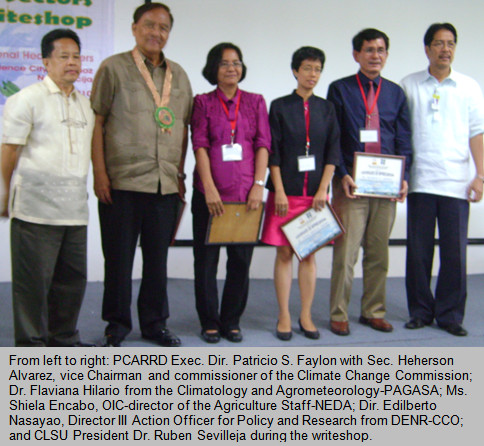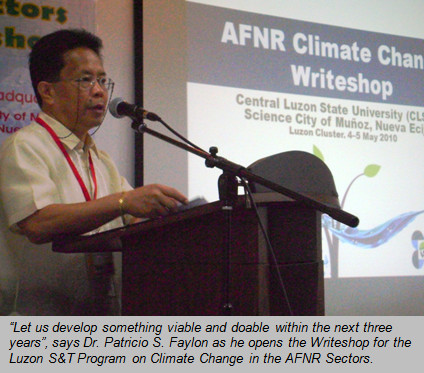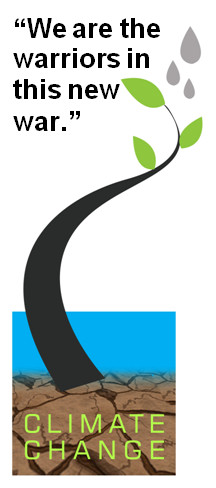 Science City of Muñoz, Nueva Ecija - “We must make our own response.” Thus said Secretary Heherson Alvarez as he exhorted various participants from the Council and its network at the writeshop to develop the “Luzon S&T Program on Climate Change in the AFNR Sectors”.
Science City of Muñoz, Nueva Ecija - “We must make our own response.” Thus said Secretary Heherson Alvarez as he exhorted various participants from the Council and its network at the writeshop to develop the “Luzon S&T Program on Climate Change in the AFNR Sectors”.
The writeshop was held on May 4─5 at the Philippine Carabao Center (PCC) and involved representatives from the Council’s six Luzon consortia.
Incidentally, Alvarez is a commissioner of the Philippine Commission on Climate Change.
Rising to the challenge
Espousing a “common but differentiated” response, Alvarez challenged the assembly to craft its own contribution to the total global outlook even as the country sets its own “voluntary targets”. He then stressed “an organized response” that builds on the synergy of various elements of the ecosystems, green construction, disaster risk communication and information systems.”
“You are expected to contribute”, Alvarez further said in addressing representatives from the consortia, members of the PCARRD directorate and other partners. Specifically, he said that the S&T (science and technology) community was expected to ensure a cut down in CO2 emissions, manage adaptation and interlink with world initiatives. In doing these however, he reminded the body to consider how much CO2 can be cut without impairing the sector’s capacity for development and growth.
In closing, he said that in the end, a balance must be struck between S&T and economics. Such “balanced intelligence” he says, will allow the country to sustain a common but differentiated response as it rises to the challenge of climate change.
Setting the framework
 Anticipating the challenges that climate change will pose to the agriculture, forestry and natural resources (AFNR) sectors, the Council-organized writeshop provided a venue for brainstorming on specific projects of the S&T Climate Change agenda in the AFNR sectors as well as national climate change plans and to eventually come up with an integrated Luzon-wide S&T Program on Climate Change (CC) in the AFNR sectors.
Anticipating the challenges that climate change will pose to the agriculture, forestry and natural resources (AFNR) sectors, the Council-organized writeshop provided a venue for brainstorming on specific projects of the S&T Climate Change agenda in the AFNR sectors as well as national climate change plans and to eventually come up with an integrated Luzon-wide S&T Program on Climate Change (CC) in the AFNR sectors.
PCARRD Executive Director Patricio S. Faylon set the tone for the development of the Luzon-wide program by presenting the framework for climate change priority programs in the AFNR sectors. Whatever the Council and its regional partners decide to do under the proposed program, Faylon stressed that the bottom line for everything is “Food on the Table”.
To ensure tangible results in the AFNR sectors, he advised the body to consider specific interventions for the weather extremes in their respective regions. Additionally, he directed the formulation of S&T projects on the basis of the framework he presented while particularly accounting for each region’s food commodities and preferred project sites.
Focusing the Effort
To set a focus for the proposed climate change initiative, Dr. Danilo C. Cardenas, PCARRD Deputy Executive Director for Research and Development, presented the Integrated S&T Agenda on Climate Change. He emphasized the directions and priorities set in the agenda to be a basis for the proposals to be developed by the regional representatives.
Dr. Flaviana Hilario of the Climatology and Agrometeorology Branch of the Philippine Atmospheric, Geophysical and Astronomical Services –Administration (PAGASA) firmed up these priorities further as she presented the Luzon climate change scenario. She showed the local and national trends in rainfall and temperature over the years, capping her presentation with forecasts of the same elements for 2020 and 2050.
While she said that there was no visible increase in the number of typhoons for these periods, she stressed the increase in the lowest average temperature and the increase in the rainfall during the rainy season. In essence, the dry season will be drier and the rainy season with be wetter than what they are now.
Validating the Direction
 With the framework laid down and the focus set, representatives from the National Economic Development Authority (NEDA) and the Department of Environment and Natural Resources (DENR) validated the Council’s directions. In their respective messages, Ms. Sheila Encabo of NEDA and Director Edilberto Nasayao of DENR weighed in on the framework and agenda presented.
With the framework laid down and the focus set, representatives from the National Economic Development Authority (NEDA) and the Department of Environment and Natural Resources (DENR) validated the Council’s directions. In their respective messages, Ms. Sheila Encabo of NEDA and Director Edilberto Nasayao of DENR weighed in on the framework and agenda presented.
Ms. Encabo, OIC-director of Agriculture Staff of NEDA, raised the challenge of mainstreaming climate change. She then pointed to the range of scenarios that the Council will face as well as the many uncertainties that can occur with climate change.
Because of these, she stressed the need for local initiatives, specifically for tools that can be used for vulnerability and impact assessments in the various sectors. She also highlighted the “need for short-term projects for immediate gains to benefit the AFNR sectors”. Further, she reminded the body not to dissociate resource management from climate change concerns.
Finally, Encabo challenged the Council to come up with a practical program whose outputs will contribute to the planning process. With the new dispensation and the development of the next Medium Term Philippines Development Plan, there is a need for climate change to be well integrated into the plan.
For his part, Director Nasayao hailed the Council’s CC framework and said that the DENR stands behind this framework since the framework is a “perfect match” with the Environment and Natural Resources R&D (research and development) agenda. He then went on to cite the various gaps and issues connected with the banner programs of the DENR.
In ending, he described the worldwide efforts to mitigate and adapt to climate change as World War III and charged everyone to be warriors in this new war. Incidentally, Dir. Nasayao is the Action Officer for Policy and Research of the DENR’s Climate Change Office (CCO).
To further strengthen the consortiums’ arsenal in developing their proposals, Dr. Ma. Victoria Espaldon first shared the Vulnerability and Adaptation Assessment Framework. The Dean of the School of Environmental Science and Management of the University of the Philippines Los Baños emphasized that a consensus must be reached especially for measuring the vulnerability of specific areas and determining the possible impacts of climate change on these same areas. She also hinted that developing new livelihoods may not be feasible for immediate results. She instead directed the body to think about “old livelihoods under new climate”.
Writing the Proposals
Armed with the framework, direction and R&D agenda for climate change, the consortium representatives sat down to write their region’s CC program for the next five years.
Capping the two-day workshop, they presented their proposals for critiquing to a panel led by Dr. Cardenas.
Dr. Albert P. Aquino, director of the Socio-Economics Research Division and the writeshop coordinator, said that the proposals would be fine-tuned first by the proponents based on the panel’s comments. After which, the Council will package these into the Luzon S&T program on Climate Change in the AFNR Sectors. Noting the urgency of the a unified response to climate change in the AFNR sectors, Aquino is hopeful that the program will be approved and ready for implementation by the last quarter of 2010.
The six Luzon-based consortia that participated in the writeshop were: Bicol Consortium for Agriculture and Resources Research and Development, Southern Tagalog Agriculture and Resources Research and Development Consortium, Central Luzon Agriculture and Resources Research and Development Consortium, Cagayan Valley Agriculture and Resources Research and Development Consortium, Ilocos Agriculture and Resources Research and Development Consortium, and the Highland Agriculture and Resources Research and Development Consortium.
